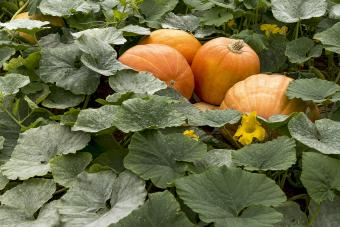
Beans: Three Sisters Garden

Corn: Three Sisters Garden

Peas

Dill

Radishes

Lemon Balm

Borage

Sunflowers

Marigolds and Squash

Don't Plant These With Squash

The Perfect Companion Plants for Your Squash

© 2025 LoveToKnow Media. All rights reserved.
Squash any doubts you have about an abundant harvest when you choose the ideal companion plants for squash.
Allison is a writer with experience writing for several websites.
Read MoreLearn about our Editorial Policy.

Summer calls for squash, and with these companion plants to keep pests at buy, encourage growth, and pull those pollinators into your yard, you're off to a good start. Squash those doubts! You're going to need to start dreaming up squash recipes.

Beans and squash are two-thirds of the Three Sisters, we'll round out the family with corn, next. Planting squash with beans means more nutrients to go around for all. Beans help to make nitrogen, which is beneficial to the squash. The squash leaves make for a shady area, keeping the weeds at bay.

The other third of the Three Sisters, growing corn provides a tall stalk for the beans to vine up, and the squash leaves keep the ground cool and weed free, and help to keep the soil moist. Be sure to plant the corn first so that they have a chance to grow unshaded by the squash.

Peas, and other legumes such as beans, help to keep nitrogen in the soil at an optimal level and boost soil conditions. In turn, you get a healthy squash harvest. Can I get a yum?

Planting dill with squash draws in the good insects. Ladybugs and lacewings enjoy a healthy diet of squash bugs, and that's a good thing because you don't want to share your squash.

A great team with the dill that attracts insects that are hungry for squash pests, radishes help to keep squash vine borers away. Without a healthy vine, your squash will struggle to get all the right nutrients. And with radishes? Consider this your daily vitamin for your squash.

Lemon balm works with your squash help to keep your soil fresh and moist, keeping both plants happy with ideal soil conditions. Plus, lemon balm keeps squash-loving pests at bay. See ya!

Borage? Borage who? Borage will repel insects and draw in pollinators, that's who. Oh, there's more. This plant also adds much-needed calcium to your squash soil. Make your pollinators and your post-harvest belly happy with these buds.

Without pollinators, you'll have no squash! In order to have a successful squash harvest, your blossoms need pollinating first. And sunflowers do the trick. Planting an array of sunflowers, especially those that don't grow as tall, will help to shade your squash as it starts to plant its roots, and attract bees and butterflies right to those blossoms.
If you enjoy squash blossoms, make sure there's no one taking a nap inside before you take a bite! Buzz buzz!

A relationship known as a "trap crop," marigolds will be a major defender in your garden. Say so long to nematodes in your garden thanks to marigolds. Plus, these flowers attract insects that'll make a meal of bugs that love to eat squash plants. Your squash lives another day.

Not every companion plant is a happy marriage or even a neutral associate. Skip the invite to these plants in your squash patch.

Fill your planters and yard with the leafy, vining goodness that is squash. From gorgeous yellow blossoms to the perfectly ripe squash it'll yield, these plants will defend, nourish, and encourage your precious squash. Nothing beats a homegrown harvest.